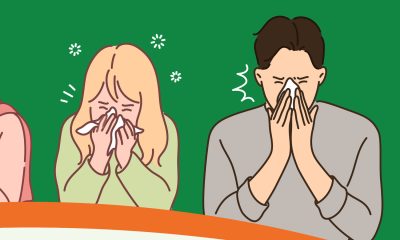By Georgia Lambert via SWNS
Depression cases tripled among single people on low wages tripled during the first year of Covid, reveals a new study.
Researchers found that people on lower incomes and those who experienced multiple Covid-related stresses were more likely to feel the toll of the pandemic, as the mental health inequality gap continues to widen.
Depression among adults persisted and worsened throughout the first year of the pandemic, according to a first-of-its-kind study by the Boston University School of Public Health (BUSPH) in the United States.
The university’s researchers found that 32.8 percent of adults experienced elevated depression symptoms compared to 27.8 percent of adults in the early months of the pandemic in 2020, and 8.5 percent before the pandemic.
The team found links between a low household income, being single, and experiencing pandemic-related stresses with the increase in depressive symptoms.
The findings showed an unmistakable link between the pandemic and its short and long-term impact on mental health, according to the research team.
Dr. Sandro Galea, dean, and Robert A Knox, a professor at BUSPH were the senior study authors of the study.
“The sustained high prevalence of depression does not follow patterns after previous traumatic events such as Hurricane Ike and the Ebola outbreak," said Galea.
“Typically, we would expect depression to peak following the traumatic event and then lower over time. Instead, we found that 12 months into the pandemic, levels of depression remained high.”
The study is the first nationally representative study in the US to examine the change in depression before and during Covid, by using the Patient Health Questionnaire-9 (PHQ 9), a global self-administered depression screening tool.
The researchers used data from more than 5,000 respondents to the 2017-18 National Health and Nutrition Examination Survey (NHANES), as well as data from two Covid Life Stressors Impact on Mental Health and Well-Being (CLIMB) surveys, conducted from March 2020 to April 2021.
Both of the surveys used the PHQ 9, which is routinely used by NHS Time to Talk, to assess the depressive symptoms and gather demographic data.
While the CLIMB surveys gathered data on Covid-related stressors, such as job loss, the death of a loved one due to Coronavirus, financial problems, feeling isolated, and a lack of childcare.
The responses to the survey suggested that the burden of depression intensified over the course of the pandemic and disproportionately affected adults on lower incomes.
When adjusting for other demographics, the team found that people earning less than $20,000 in spring 2020, were 2.3 times more likely to experience depression, compared to people making $75,000 or more.
The study revealed that a year later, low-income adults were more than seven times more likely to suffer from depression and least likely to overcome the illness, compared to the previous spring.
Catherine Ettman, the director of strategic initiatives in the Office of the Dean at BUSPH was the report’s lead author and noted that the outbreak of depression could have been a lot worse if it wasn’t for the economic relief and development of the vaccines.
“The sustained and increasing prevalence of elevated depressive symptoms suggests that the burden of the pandemic on mental health has been ongoing—and that it has been unequal," said Ettman.
“Low-income populations have been disproportionately affected by the pandemic and efforts moving forward should keep this population in mind.”
“Addressing stressors such as job loss challenges accessing childcare, and difficulties paying rent, will help to improve population mental health and reduce inequities that have deepened during the pandemic.”
The findings were published in The Lancet Regional Health - Americas journal.

 Parenting1 week ago
Parenting1 week ago
 Lifestyle1 week ago
Lifestyle1 week ago
 Wildlife3 days ago
Wildlife3 days ago
 Good News4 days ago
Good News4 days ago
 Health4 days ago
Health4 days ago
 Entertainment1 day ago
Entertainment1 day ago
 Broadcast10 hours ago
Broadcast10 hours ago
 Travel4 days ago
Travel4 days ago












